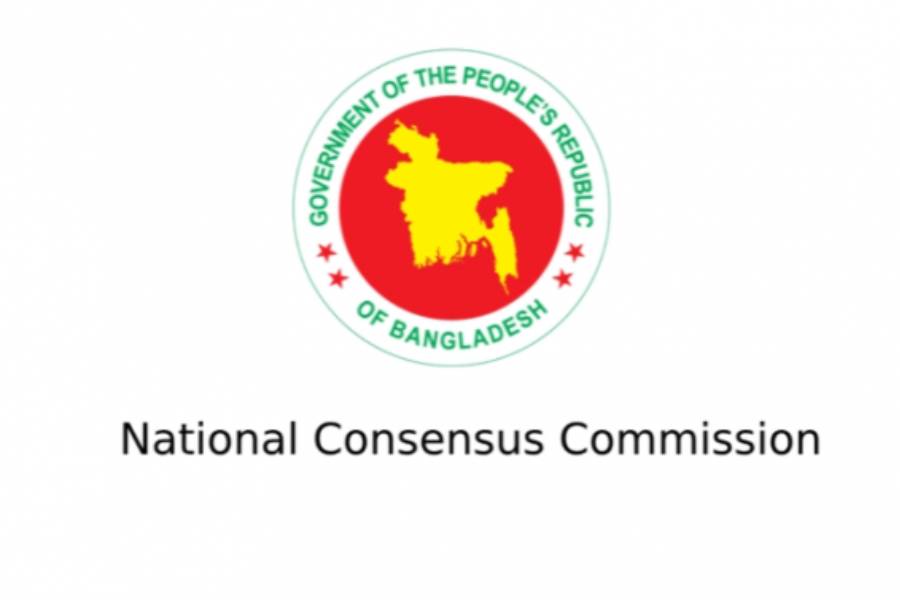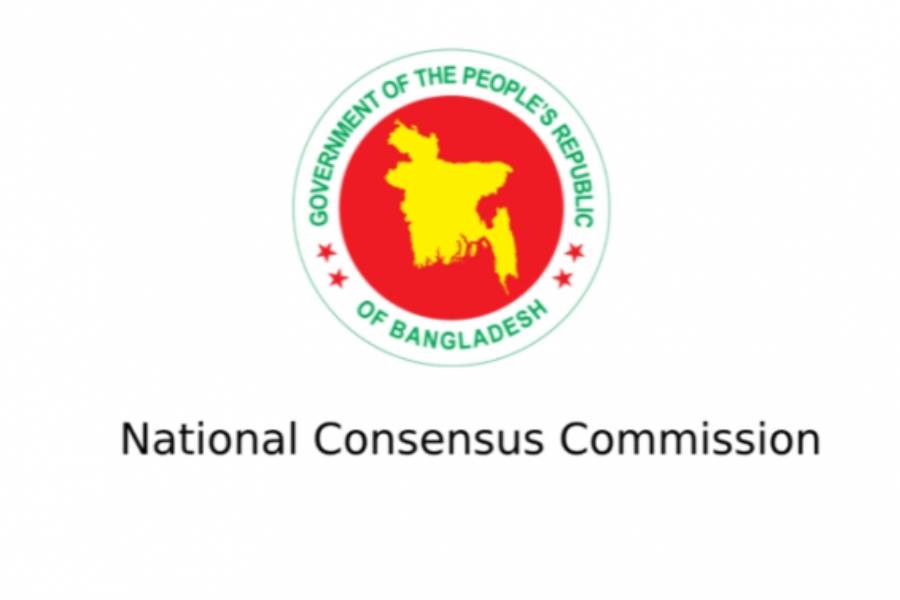Saif
Senior Member
- Messages
- 15,397
- Nation

- Axis Group


PM’s 10-year term, police commission agreed
Political parties on Sunday agreed that no individual should hold office of the prime minister for more than 10 years in his or her lifetime. They have also agreed to the establishment of an independent police commission...
 www.newagebd.net
www.newagebd.net
NCC CONSENSUS TALKS
PM’s 10-year term, police commission agreed
Staff Correspondent 27 July, 2025, 23:22
Political parties on Sunday agreed that no individual should hold office of the prime minister for more than 10 years in his or her lifetime. They have also agreed to the establishment of an independent police commission.
Thirty political parties, including Bangladesh Nationalist Party, Bangladesh Jammat-e-Islami and National Citizen Party, agreed on the issues while attending the National Consensus Commission’s second-round dialogue at the Foreign Service Academy in Dhaka.
The parties agreed that the next parliament would frame a new law to facilitate the nine-member police commission to ensure professionalism and accountability in the Bangladesh Police.
Chaired by the NCC vice-chair Professor Ali Riaz, the 19th session also covered a discussion on the state’s fundamental principles and women’s representation in the parliament.
Ali Riaz said that the NCC must conclude the dialogue by July 31. ‘A draft of the national charter’s prologue will be shared with political parties on Monday (today).’
In the discussion on the state’s fundamental principles, a tense situation arose when left-leaning parties warned that they would quit the NCC dialogue if the constitution’s existing principles -- nationalism, socialism, democracy, and secularism -- were replaced with anything else.
Earlier in the discussion, the NCC proposed an independent police commission which was agreed by the political parties following debates.
As per their agreement, the commission will address complaints raised either by any member of the police force or any citizens against them.
The objectives of the police commission will be to ensure that the police, as a disciplined force, are capable of performing their duties lawfully and efficiently.
A retired judge of the Appellate Division, not older than 75 years, will chair while a retired police officer not below the rank of additional inspector general and not older than 62 years will serve as the member secretary of the commission.
The other members will include a lawmaker representing the leader of the parliament, another lawmaker representing the main opposition leader, representatives of the parliament speaker and deputy speaker, a retired government officer not below the rank of secretary, a retired judicial officer not below the rank of district judge, a human rights activist with at least 10 years of hands-on experience in a registered human rights organisation in the country or abroad.
The commission must accommodate at least two women members. The policy-making and executive functions of the commission will be approved by a majority of the commission members.
The politicians also agreed that the home affairs minister, the chair of the parliamentary standing committee on the home affairs ministry and a High Court judge with no less than 10 years of experience will select the commission’s chair, member secretary, the retired government officer, the retired judicial officer and the human rights activist.
The next parliament will enact a law determining the duties, responsibilities, powers, accountability, resignation rights, and removal procedures of all the commission members.
The politicians also agreed to seven specific directives regarding the core responsibilities and scopes of the police commission, but said that these needed to be defined by the law.
The directives stipulated that the police commission will be empowered to determine and direct the implementation of disciplinary actions against police personnel for unlawful conduct.
It may issue binding directives to protect officers from unlawful influence or interference in their duties. The commission will also be responsible for investigating citizen complaints against police members and taking appropriate legal action.
When necessary, the commission may conduct judicial inquiries with support from law enforcement agencies or the government. All relevant authorities will be legally bound to comply with the commission’s directives and decisions.
The NCC later brought up an adjourned discussion over the state’s fundamental principles on the table. According to its proposal, equality, human dignity, democracy, social justice, and religious freedom and harmony would be mentioned as the state’s fundamental principles.
The BNP’s Salahuddin said that the decision on the existing fundamental principles remained sub-judice until the review on the 15th amendment of the constitution was solved.
‘However, the next parliament can decide on the matter whether the fundamental principles, guided by the fifth amendment, will be reinstated or not. But the BNP is supporting the NCC’s proposal,’ he said.
The fifth amendment in 1979 adopted ‘Absolute trust and faith in Allah’ as the first fundamental principles of the state.
NCP member secretary Akhtar Hossen said that his party strongly opposed the existing fundamental principles while Jamaat nayeb-e-amir Syed Abdullah Mohammad Taher, supporting the fifth amendment, recommended that the decision should be made on a majoritarian basis.
However, the Communist Party of Bangladesh, Socialist Party of Bangladesh, SPB (Marxist) and Bangladesh Jatiya Samajtantrik Dal-Jasod strongly opposed replacing the existing principles with other principles.
CPB general secretary Ruhin Hossain Prince warned, ‘Left-leaning parties will boycott the dialogue if the existing principles are excluded.’
Regarding women’s representation in the parliament, the BNP’s Salahuddin voted for maintaining the existing electoral provision for the 50 women reserved seats.
He presented a new idea, saying, ‘In the upcoming national election, each political party may nominate women candidates in at least 5 per cent of the 300 constituencies. For the next national election, the percentage will be raised to 10.’
Bangladesh Khelafat Majlis and Khelafat Majlis changed their previous position, recommending shared vote-based proportional representation to elect women for 100 reserved seats.
The session ended at 8:30pm without any decision.
PM’s 10-year term, police commission agreed
Staff Correspondent 27 July, 2025, 23:22
Political parties on Sunday agreed that no individual should hold office of the prime minister for more than 10 years in his or her lifetime. They have also agreed to the establishment of an independent police commission.
Thirty political parties, including Bangladesh Nationalist Party, Bangladesh Jammat-e-Islami and National Citizen Party, agreed on the issues while attending the National Consensus Commission’s second-round dialogue at the Foreign Service Academy in Dhaka.
The parties agreed that the next parliament would frame a new law to facilitate the nine-member police commission to ensure professionalism and accountability in the Bangladesh Police.
Chaired by the NCC vice-chair Professor Ali Riaz, the 19th session also covered a discussion on the state’s fundamental principles and women’s representation in the parliament.
Ali Riaz said that the NCC must conclude the dialogue by July 31. ‘A draft of the national charter’s prologue will be shared with political parties on Monday (today).’
In the discussion on the state’s fundamental principles, a tense situation arose when left-leaning parties warned that they would quit the NCC dialogue if the constitution’s existing principles -- nationalism, socialism, democracy, and secularism -- were replaced with anything else.
Earlier in the discussion, the NCC proposed an independent police commission which was agreed by the political parties following debates.
As per their agreement, the commission will address complaints raised either by any member of the police force or any citizens against them.
The objectives of the police commission will be to ensure that the police, as a disciplined force, are capable of performing their duties lawfully and efficiently.
A retired judge of the Appellate Division, not older than 75 years, will chair while a retired police officer not below the rank of additional inspector general and not older than 62 years will serve as the member secretary of the commission.
The other members will include a lawmaker representing the leader of the parliament, another lawmaker representing the main opposition leader, representatives of the parliament speaker and deputy speaker, a retired government officer not below the rank of secretary, a retired judicial officer not below the rank of district judge, a human rights activist with at least 10 years of hands-on experience in a registered human rights organisation in the country or abroad.
The commission must accommodate at least two women members. The policy-making and executive functions of the commission will be approved by a majority of the commission members.
The politicians also agreed that the home affairs minister, the chair of the parliamentary standing committee on the home affairs ministry and a High Court judge with no less than 10 years of experience will select the commission’s chair, member secretary, the retired government officer, the retired judicial officer and the human rights activist.
The next parliament will enact a law determining the duties, responsibilities, powers, accountability, resignation rights, and removal procedures of all the commission members.
The politicians also agreed to seven specific directives regarding the core responsibilities and scopes of the police commission, but said that these needed to be defined by the law.
The directives stipulated that the police commission will be empowered to determine and direct the implementation of disciplinary actions against police personnel for unlawful conduct.
It may issue binding directives to protect officers from unlawful influence or interference in their duties. The commission will also be responsible for investigating citizen complaints against police members and taking appropriate legal action.
When necessary, the commission may conduct judicial inquiries with support from law enforcement agencies or the government. All relevant authorities will be legally bound to comply with the commission’s directives and decisions.
The NCC later brought up an adjourned discussion over the state’s fundamental principles on the table. According to its proposal, equality, human dignity, democracy, social justice, and religious freedom and harmony would be mentioned as the state’s fundamental principles.
The BNP’s Salahuddin said that the decision on the existing fundamental principles remained sub-judice until the review on the 15th amendment of the constitution was solved.
‘However, the next parliament can decide on the matter whether the fundamental principles, guided by the fifth amendment, will be reinstated or not. But the BNP is supporting the NCC’s proposal,’ he said.
The fifth amendment in 1979 adopted ‘Absolute trust and faith in Allah’ as the first fundamental principles of the state.
NCP member secretary Akhtar Hossen said that his party strongly opposed the existing fundamental principles while Jamaat nayeb-e-amir Syed Abdullah Mohammad Taher, supporting the fifth amendment, recommended that the decision should be made on a majoritarian basis.
However, the Communist Party of Bangladesh, Socialist Party of Bangladesh, SPB (Marxist) and Bangladesh Jatiya Samajtantrik Dal-Jasod strongly opposed replacing the existing principles with other principles.
CPB general secretary Ruhin Hossain Prince warned, ‘Left-leaning parties will boycott the dialogue if the existing principles are excluded.’
Regarding women’s representation in the parliament, the BNP’s Salahuddin voted for maintaining the existing electoral provision for the 50 women reserved seats.
He presented a new idea, saying, ‘In the upcoming national election, each political party may nominate women candidates in at least 5 per cent of the 300 constituencies. For the next national election, the percentage will be raised to 10.’
Bangladesh Khelafat Majlis and Khelafat Majlis changed their previous position, recommending shared vote-based proportional representation to elect women for 100 reserved seats.
The session ended at 8:30pm without any decision.




